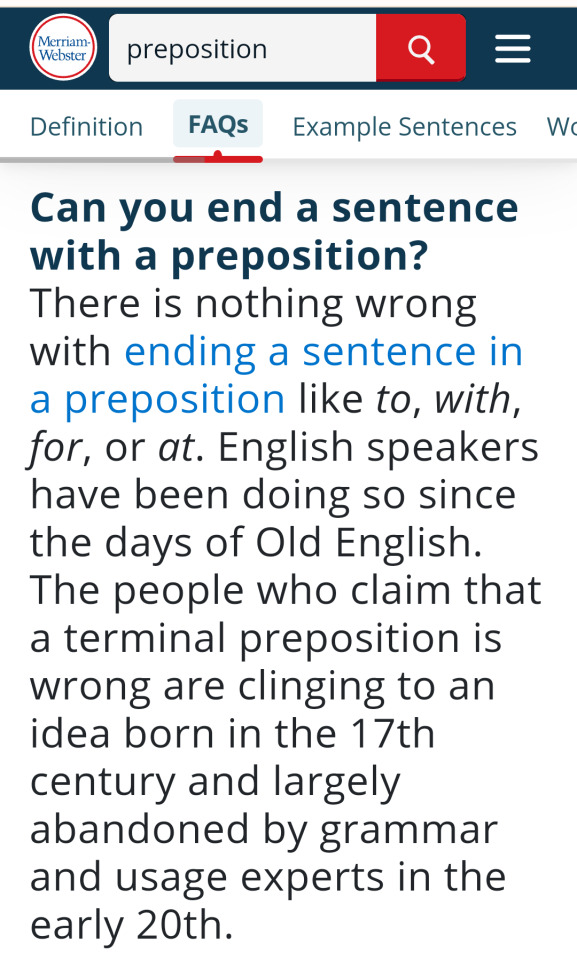#prepositions
Text
Drew this for five extra credit points in my German class. It took an hour :’)

#German#German class#über#link#legend of Zelda#breath of the wild#legend of zelda breath of the wild#paraglider#bokoblin#poster#Akkusativ#accusative#prepositions#language#extra credit#fanart#shitpost#artwork#art
26 notes
·
View notes
Text
function words after getting kicked out of the acronym

#linguistics jokes#grammar#acronym#function words#prepositions#articles#conjunctions#langblr#language#language blog#languageblr#language meme#language memes#linguistics#linguistics humor#language learning#english#linguistics memes#linguistics blog#lingblr#studyblr#language lover#lingblog#linguistics tumblr#languages
99 notes
·
View notes
Text
question to the conlangers and all the other linguistics enthusiasts:
what exactly is the difference between adpostitions and articles? can they, in a wa, not contain the same information?
im mostly asking this because for a conlang im working on, its going to rely alot on a wide array of prepositions-article-thingies. They decline for number, person and noun class. There is one specifically for the direct object, however, there is none for the subject. the others are pretty much normal prepositions.
So what would this be classified as?
17 notes
·
View notes
Text
A vs IN [prepositions part 2]
PART ONE
Generally speaking, with names of cities, you need to use “A”:
Vado a Roma (=I go to Rome; moving towards/to a place);
Sono a Roma (=I am in Rome; presence in a palce).
When you want to talk about movement as in coming from a city, use the preposition “DA”: Vengo da Roma (=I come from Rome).
With the noun “città”, use the preposition “IN”.
Sono in città (=I am in the city); Vado in città (=I go to the city). To express movement like coming from the city, use the preposizione articolata “DALLA”: Vengo dalla (da + la) città (=I come from the city).
In case you want to add the aggettivo possessivo, you need to add the article as well (generally in Italian the aggettivo possessivo needs the articolo determinativo, except for family members as “mio padre/mia madre/mio zio...”). So basically, you need to use the preposizione articolata again (articolo + preposizione): Sono nella (in=ne + la) mia città (=I am in my city); Vado nella (in=ne + la) mia città (=I go to my city); Vengo dalla (da + la) mia città (=I come from my city).
If you need to talk about coming back (=tornare) to your or a general city, the rules are the same:
Torno nella (in=ne + la) mia città (=I come back to my city).
Torno in città. (=I come back to the city)
-> To be honest, even if you don’t add the aggettivo possessivo, unless you’re in a different place, it’s kinda obvious that you’re moving to a specific city: let’s suppose you’re in the countryside around a city or even close to the city center but not in the city center of this city yet, and you say “Vado in città”: it means you’re going to that city center.
Summing up: when talking about being in a place (stato in luogo complement) and/or moving towards/to a place (moto a luogo complement), use “a + name of a city” OR “in + città”. When talking about coming from a place (moto da luogo complement), use da.
--
To express the MOTO A LUOGO (moving to a place) complement, there are actually 3 ways:
1) IN/NEL/NELLA: vado IN città, vado IN campagna, vado IN montagna (beware of the exception: vado AL mare), vado IN farmacia (vado NELLA farmacia all’angolo: preposizione articolata is used for more specific places)
2) A/AL/ALLA: vado A Roma, vado A casa, vado A casa di Marco, vado A casa della nonna, vado AL bar, vado AL ristorante, vado AL supermercato
3) DA/DAL/DALLA (generally used when a place involves people more directly/you associate place and people there): vado DAL barbiere, vado DALLA nonna, vado DA Luca, vado DAL macellaio
All these situations and exceptions (can be found more approfonditely in part 1 or ofc send an ask) must be learned by heart (or at least, you need to listen and practice a lot of Italian).
#it#italian#italiano#lingua italiana#italian grammar#grammatica italiana#italianblr#langblr#languageblr#languages#language#italian language#italian langblr#prepositions#prepositioni#traduzioni#grammatica grammar
36 notes
·
View notes
Text
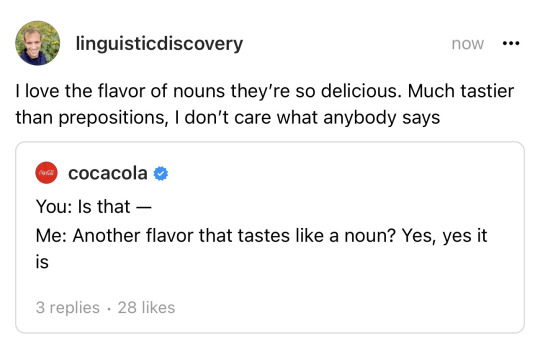
9 notes
·
View notes
Text
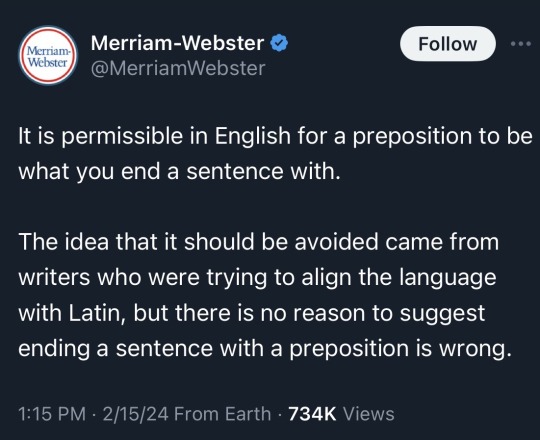
Saw this on my tl and was like, oooooh. 😯 Sheldon would be all over this faster than the speed of light. He would be taking the Merriem-Webster account to the MAT. I would totally love to see that Twitter war. 😍
3 notes
·
View notes
Text
Some Arabic prepositions
مِنْ [min] - from
إِلَى [ʾilā] - to
عَنْ [ʿan] - about
عَلَى [ʿalā] - on
فِي [fī] - in
حَتَّى [ḥattā] - until
فَوْقَ [fawqa] - above
تَحْتَ [taḥta] - under
أَمَامَ [ʾamāma] - in front of
خَلْفَ [ḵalfa] - behind
بَيْنَ [bayna] - between
بِجَانِبِ [bi-jānibi] - beside
قَبْلَ [qabla] - before
بَعْدَ [baʿda] - after
#Arabic#العربية#polyglot#languages#langblr#languageblr#language blog#langspo#tongueblr#studyblr#vocab#prepositions
82 notes
·
View notes
Text

2 notes
·
View notes
Text
Preposisjoner i tidsuttrykk ⌛️📅
Just some charts/diagrams/notes I made while studying Norwegian temporal prepositions.
When something happened in the past ➡️ for ... siden

When something will happen in the future ➡️ om / til

How long something is lasting ➡️ i / på / siden
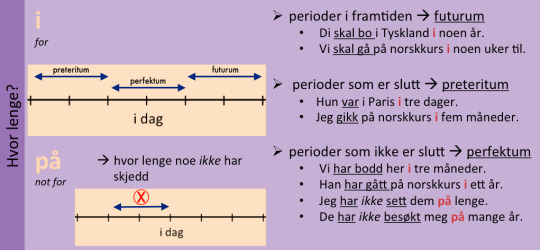

How long it takes to do/complete something ➡️ på

Sorry, no charts for...
før (before) - før jul (before Christmas)
etter (after) - etter ferien (after the holidays)
fra ... til ... (from ... to ...) - fra fem til sju (from five to seven)
i løpet av (during) - i løpet av studiene (during the studies)
under (during - *ongoing through or during the time something lasts*) - under krigen (during the war)
innen (by, within) - innen fredag (by Friday)
omkring (about, around) - omkring ti minutter (about ten minutes)
omtrent (approximately) - omtrent 20 barn (approximately 20 children)
And here’s a summary I made... I also included the matching German prepositions (in blue) and German translation of the example sentences.
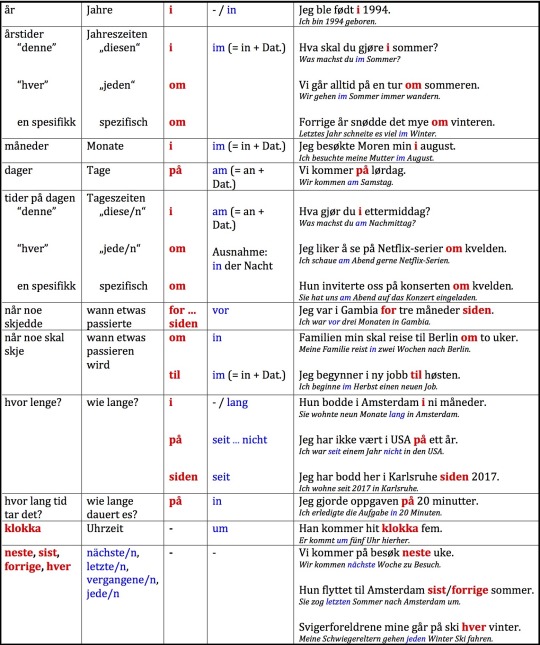
Time adverbials in Norwegian-Germam-English - comparison
In Norwegian, adverbials (which tell you when, where, how, or why something is done) can be first or last in a sentence. In German, adverbials coming first is also not a problem. If the adverbial is first, in both Norwegian and German the verb will come second. In English, the subject still comes before the verb:
Nå skinner sola i Oslo. / I Oslo skinner sola nå.
Jetzt scheint die Sonne in Oslo. / In Oslo scheint jetzt die Sonne.
Now the sun is shining in Oslo. / In Oslo the sun is shining now.
However, in a sentence where both time and place are mentioned together after the verb in Norwegian, place is usually before time in the sentence (like in English). In German, time comes before place.
Sola skinner i Oslo nå.
Die Sonne scheint jetzt in Oslo.
The sun is shining in Oslo now.
111 notes
·
View notes
Note
I know you say you feel like you struggle with this too, but do you have any advice for remembering prepositions? I know it's a lot of memorizing, but are there any sort of patterns, or like little hints to guessing what preposition a phrase or verb might take. If you have any sort of guide on this already written pls let me know and I can try to find it lol.
Spanish Verbs with Prepositions - Lawless Spanish Grammar
This is my go-to for understanding the prepositions because it has such a comprehensive list. And from there I usually research a bit more to see what they look like when you use them.
In other words, something like alegrarse takes de... but if you use it with a noun: me alegro de eso "I'm glad about that"; if you use it with a verb you need a que.... me alegro de que estés aquí "I'm glad that you're here"
The prepositional verbs always throw me off because a lot of the time the prepositions in English are different from Spanish like "dreaming of" while Spanish uses con "with"
-
Unfortunately there's not really a lot of clues, it's just things you start to learn. Most of the time it's with verbs you come across a lot:
preguntar por = to ask about / to ask after [someone]
disculparse por = to apologize for
preocuparse por = to worry about
pensar en = to think of
acordarse de = to remember
enamorarse (de alguien) = to fall in love (with someone)
soñar con = to dream of/about
acostumbrarse a = to get used to / to get accustomed to
And then some weird ones usually with a
ir + a + hacer algo = going to do something
volver (a hacer algo) = to do something (again)
asistir a (un lugar) = to attend/to go to a place
jugar (a un juego) = to play a game
The other important ones to know are the ones related to the senses:
saber = to know [things/facts]
saber a = to taste like
saber a piña = to taste like pineapple
saber a jamón = to taste like ham
saber a cereza = to taste like cherry
saber a ceniza = to taste like ash
-
oler* = to smell
oler a = to smell like
oler a humo = to smell like smoke
oler a rosas = to smell like roses
oler a ajo = to smell like garlic
oler a brisa marina = to smell like sea breeze
saber tends to throw people off a lot because they know saber as "to know" and then saber as taste - "savor" or "flavor" [sabor] throws them off a lot because it's so different
*oler is an O=>UE verb but it's a bit weird because it needs an H in front; oler is a very odd verb that way but it's done to preserve the verb... so as an example:
El perfume huele a azahar. = The perfume smells like orange blossom.
La colonia huele a sándalo. = The cologne smells like sandalwood.
La vela huele a tarta de manzana con canela. = The candle smells like apple pie with cinnamon.
#Spanish#language#languages#la gramatica#prepositions#learn spanish#learning spanish#asks#preposiciones
43 notes
·
View notes
Text
watching my dad's church choir christmas concert and in the little sermon the pastor said jesus was born "as a virgin" and I can't stop laughing
3 notes
·
View notes
Text
“Sweetie, I want to be above, below, inside, behind, to the left, to the right, diagonally, parallel and perpendicular to you!”
“Darling, are you prepositioning me?”
5 notes
·
View notes
Text
Devil you say

I don't think the conjecture on the famous "Betty and Veronica sell their souls to the devil", that it was originally written for Madhouse, is accurate. The basis for the claimant is that the story does not read like the material published in the regular comics and that it fit the material published in Madhouse. The problem is that both premises are wrong. The Devil is just one more supernatural or cryptid entity that walked through Riverdale in the early 1960s. And this was not Archie's Madhouse's style.
I guess the devil narrates this Life With Archie "strange doings in the Bermuda Triangle" story. Except it's the Devil's Triangle -- a dull enough story that no one's tried to force a strained innuendo off the title.

Of, for -- I doubt anyone noticed.

Loosened code -- the Betty and Veronica sell their souls tale had the identity as "Mr. Inferno". To be sure, the story where the devil tempts Jughead for hamburgers mentions no devil, but gives more sets and fixed details.

#Archie Comics#Devil#Archie Andrews#Helicopter#Devil's Triangle#Bermuda Triangle#Bob Bolling#1976#Pop Tate#Nephew#Pop' Chock'litt Shoppe#monitors#hamburger#Selling souls#Samm Schwartz#1985#Prepositions
3 notes
·
View notes
Text
How to Use BY
BY can be a preposition and an adverb.
They lived in a small house by the road. (preposition).
Clive was passing by the department store. (adverb)
Here are 10 different uses of BY:
By as a means of transport
By to show how something is done
By to show how something happens
By with adjectives
By with time expressions
By meaning “next to”
By with gerund
By for…
Continue reading

View On WordPress
#grammar#how to use by#LearnEnglish#LearnEnglishOnline#prepositions#SkypeEnglishLessons#ZoomEnglishLessons
9 notes
·
View notes
Text
Me tryna define a preposition in my own words without using the preposition




#i tried to define the word 'for' and still cant. i just 'feel' the word. strange phenomena#linguistics#my speech#prepositions#adpositions#grammar#linguistics memes
2 notes
·
View notes
